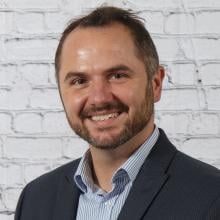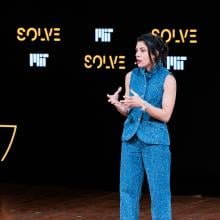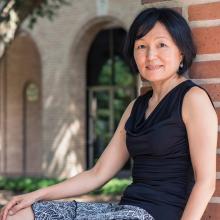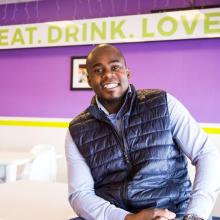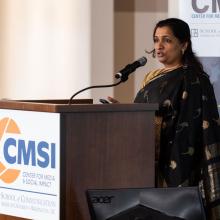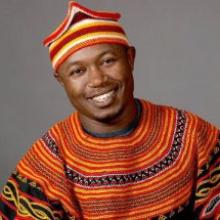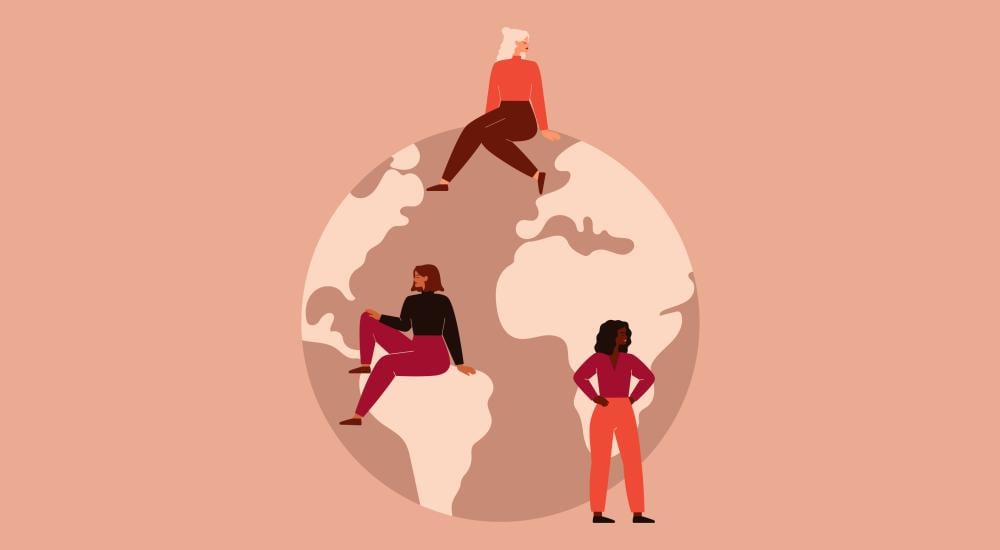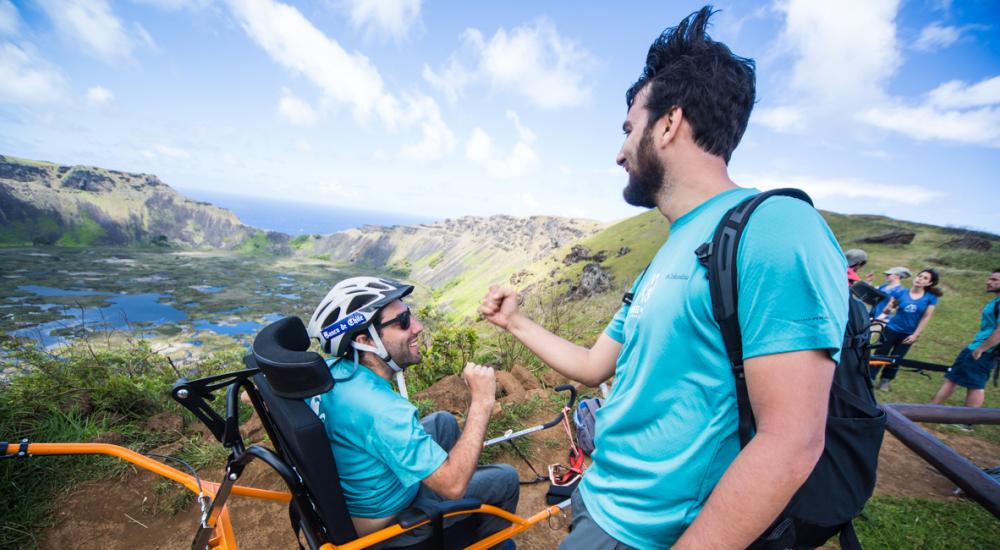Changemakers: Former International Students Make Their Mark
International students come to the United States seeking to change their lives—and the lives of those around them. In their research labs and through local and global initiatives, many go on to do just that. The six former international students highlighted here represent just a small slice of the massive impact that these students have on the world.
Mircea Handru
Country of origin: Romania
U.S. alma mater: Tiffin University
Current role: Executive director, Mental Health and Recovery Services Board of Seneca, Ottawa, Sandusky, and Wyandot Counties in Ohio
Mircea Handru came to Tiffin University in Ohio as a student-athlete and went on to coach the university’s men’s and women’s soccer teams as a graduate student, ultimately becoming a full-time assistant coach for the men’s team. His experiences on and off the field, Handru says, prepared him for a role in which he helps people struggling with mental illness and addiction—and the stigma associated with both.
“My experience as an international student and as a student-athlete shaped my personality into one of commitment and openness to different perspectives,” he says. “My lessons from the soccer field continue to shape who I am today in my role as executive director of a public entity.”
As leader of the Mental Health and Recovery Services Board of Seneca, Ottawa, Sandusky, and Wyandot Counties, Handru works with elected officials, state and federal agencies, and families to support mental health and addiction services across Northwest Ohio.
Handru has helped establish a 24/7 crisis text line and mental health counseling in local schools and has enhanced collaboration with local law enforcement and first responders. He is particularly proud of his role in creating a local mobile crisis response team.
“It was a service that we hoped to have for many years but didn’t think it could be implemented and financially sustained,” Handru says. “With a good financial plan in place and assistance from local first responder leaders, we were able to successfully implement this much-needed service.”
Handru shares with family and friends “the positive impact of having international students study and work in the United States.” Reflecting on his own contributions, he returns to an athlete’s mindset. “I am what I repetitively do,” he says. “What do I want to be as a professional, as a husband, and as a father? The more I impact who I am, the better I can deliver for my employer and my family.”
Advice for international students
“The United States is still the land of opportunities. Get out and network, commit to your goals, and find a field of work that inspires you. Communities throughout the entire country need young people who are ready to lead and fill in the gaps of many unmet needs. Don’t focus just on a job but rather on a career path where you can find your purpose.”
Hala Hanna
Country of origin: Lebanon
U.S. alma mater: Harvard University
Current role: Executive director, Massachusetts Institute of Technology Solve
Hala Hanna grew up in Lebanon, a country with “millennia of history but a complex and unstable political landscape,” she says. Her experiences as an international student, however, ultimately led to a role looking forward—to the potential of technology and innovation to close equity gaps around the globe.
“Each step of the road reinforced the lesson that true innovation arises at the intersection of diverse experiences and ideas,” Hanna says.
As executive director of Solve, an initiative of the Massachusetts Institute of Technology (MIT), Hanna works with social entrepreneurs and innovators around the world to “find and scale solutions for the world’s pressing global challenges,” she says.
MIT Solve has run more than 85 challenges in areas ranging from climate change and health to learning and economic development. The initiative has mobilized more than $70 million in direct funding, helping improve more than 260 million lives around the world. “I’m proud of these impact numbers, but it’s the faces, stories, grit, and determination behind them that drive our mission,” she says. “I am constantly reminded of the limitless potential of human ingenuity when we break down barriers and work together across borders.”
And Hanna continues to look to the future with optimism. “I would love to see a world where we expand the problem-solving table and add as many chairs as needed so that every voice, idea, and experience are heard,” she says. “I wish to create ecosystems where diverse talent can thrive and where sustainable, inclusive solutions can emerge and scale.”
Advice for international students
“When you embark on an international study experience, you leave all that is familiar behind. Beyond the physical relocation of home, it is also reimagining yourself and your place in the world. Embrace the challenge wholeheartedly. Remember, you have already shown tremendous courage by stepping out of your comfort zone and venturing far from home. Each obstacle you overcome, no matter how small, will build your confidence and get you closer to your destination. Stay true to your values. While this new life offers a unique opportunity to reinvent yourself, never lose sight of what makes you uniquely you. Your lived experiences, your cultural heritage, and your personal journey are your greatest assets.”
Qilin Li
Country of origin: China
U.S. alma mater: University of Illinois Urbana-Champaign
Current role: Professor of environmental engineering and codirector of Nanosystems Engineering Research Center for Nanotechnology-Enabled Water Treatment (NEWT), Rice University
As an environmental engineering student in China in the 1990s, Qilin Li aspired to staunch the air pollution sparked by her country’s rapid growth. Her experience as a student and researcher in the United States shifted her focus to water—and a global scope.
“Most of us who live in developed countries don’t worry about water, but it is a burden to very large populations in the world,” she says.
Graduate studies at the University of Illinois Urbana‑Champaign introduced Li to innovative membrane technologies, which hold great promise in water purification and desalinization. Equally importantly, her mentor—Professor Vernon L. Snoeyink, a founder of cultural awareness in science and engineering (CASE)—helped her navigate a new culture and consider a career in academia.
“He had a huge impact on my studies and my future career choice,” Li says. “That has made me more aware that the way students see us and how we see students can be vastly different from each student’s perspective.”
At Rice University, Li is codirector of the Nanosystems Engineering Research Center for Nanotechnology-Enabled Water Treatment (NEWT), which aims to develop energy-efficient water filtration, wastewater reuse, and desalination technologies to find solutions for sustainable water supplies around the world. As her research defines the next generation of water systems, Li is optimistic that new technology will help make scarcity a thing of the past.
“People have to expend a lot of resources to ensure they have access to the quantity and quality of water that’s necessary to have a healthy life,” Li says. “With technology innovations, that will no longer be the case for the next generation. I hope that water will not be something that burdens any of us in our daily lives.”
Advice for international students
“Be open minded and aware of cultural differences, our educational and cultural backgrounds, and the ways that we interact with people. For international [researchers], it’s important to find a team where not only the research but also the culture and atmosphere of the lab are a good fit for them.”
Jermaine Rodney
Country of origin: Jamaica
U.S. alma mater: Western Colorado University
Current role: Local businessman, university database administrator
When Jermaine Rodney came to Western Colorado University in Gunnison, Colorado, from his native Jamaica, he was surprised by the long, dark winters—and the lack of irie.
“If someone says, ‘I’m not feeling like myself today,’ in my culture, you try to help that person get back to where they need to be,” he says. “No matter what you’re going through, when you step into irie, you set that aside and focus on the present—you have life; you have hope.”
Instead, Rodney saw young people struggling in a remote community with high suicide rates. Attending a community forum for high school students, he heard the same thing over and over: “There is nothing to do and nowhere to connect,” he says. “That drives so many things—isolation, loneliness, depression, self-doubt. I wanted a place where all are welcome to stay as long as they desire.”
In June 2017, Rodney opened Jermaine’s, a frozen yogurt shop created as a place for young people to “feel safe, welcome, and loved,” he says. Bright colors provided an antidote for bleak winter nights, couches and a projector showing movies encouraged people to gather and linger, and customers are permitted to bring food from other places—or spend nothing at all.
Rodney recalls Jermaine’s opening day, when a customer struck up a conversation with him that lasted until 1:30 a.m.. The next day, he returned to tell Rodney that he had contemplated suicide that evening and that their conversation had helped change his mind.
“We want to be there for each other,” Rodney says.
Jermaine’s celebrated its seventh anniversary this summer. Rodney has since opened two other local businesses and is involved in a variety of local charitable causes. He continues to work full-time at Western Colorado as a database administrator and fully embraces his adopted community, winters and all.
“I hate the cold, but I love the snow,” he says. “There’s something about it that calms my spirit.”
Advice for international students
“Don’t be deterred and discouraged by the roadblocks. Despite what may come, you will get to that finish line. Keep on fighting.”
Varsha Ramani
Country of origin: India
U.S. alma mater: American University
Current role: Director of operations, Center for Media & Social Impact (CMSI), American University
Varsha Ramani has always been “fascinated by stories—how we tell them, who tells them, and how they are received,” she says. She came to the United States with a background in journalism and has since worked in communications roles on three continents, but it was regular potlucks with other international students at American University’s School of International Service that brought her a new understanding of the power of conversation.
“This was a beautiful experience for me,” she says. “We spoke about global issues, and through these discussions, I learned a lot—not just about each other, but also about inherent biases and overarching kindness… I feel that having conversations is the best way to address global challenges. We see the world increasingly being siloed and people belonging to camps of what they strongly believe in. What we now need is for people to reach out across camps and start talking to each other—not to convince the other person but to hear their point of view and perspective.
As director of operations at American University’s Center for Media & Social Impact (CMSI), Ramani helps support and design “media that matter”—a wide range of independent, documentary, and participatory media with an emphasis on equity, social change, and social justice.
CMSI has focused on comedy as an important tool for social justice, health, and equity, including its GoodLaugh production engine and knowledge lab, which “brings together the most talented minds in humor, social justice, entertainment, and philanthropy to collaborate and create comedy and research to help repair the world and build a more just, equitable future,” according to the center’s website. Ramani supports GoodLaugh initiatives like the Yes and Laughter Lab (YALL)—a pipeline for diverse comedy writers with a focus on women; LGBTQ+; Muslim; and Black, Indigenous, and other people of color creatives—and the Climate Comedy Cohort, which helps “flip the script on climate change messaging from doom and gloom to hope, optimism, and efficacy.”
Ramani believes connections like these can help bring about a more equitable world. “I would like to continue exploring the role of narrative in our lives, especially exploring the question of whose stories are being told, who is telling these stories, and, more importantly, whose voices are not in the room,” she says.
Advice for international students
“The two things that strike me are… 1) Find your tribe: Being an international student may look glamorous, but it can also be fraught with loneliness and uncertainty. Being away from family and friends and everything familiar is never easy, so find your tribe of people who can be your comfort zone when you need one. 2) Keep an open mind: We all are used to doing things a certain way, and being an international student often means unlearning and relearning a lot of things. I believe people who study internationally have an innate way of adapting, and this helps them in looking at issues from a wider perspective, which is what is needed to make a positive impact.”
Farmer Tantoh
Country of origin: Cameroon
U.S. alma mater: Northeast Wisconsin Technical College
Current role: Founder, Save Your Future Association (SYFA)
Farmer Tantoh’s first name wasn’t always meant as a compliment. As a teenager in rural Cameroon, he was sometimes ridiculed for planting garlic, raising animals, and growing a vegetable garden. But farming became his life’s passion, ultimately leading to a growing agricultural and environmental movement in rural Central Africa.
With a scholarship from the U.S. State Department, Tantoh attended Northeast Wisconsin Technical College (NWTC) in Green Bay to study sustainable agriculture and horticulture. While in Wisconsin, he spoke to community groups about his native country, and his experience at NWTC “enabled me to bring the knowledge back home and now pass on the ideas to the younger folks,” he says.
Tantoh founded the nonprofit Save Your Future Association (SYFA) in 2005, focusing on improving water supplies, education, conservation, and sustainable landscaping in Central Africa. He has received numerous awards, including the African International Achievers Award and an Ashoka Fellowship and was a finalist in the Energy Globe World Award. SYFA is transitioning to a foundation in his name, which will focus on ensuring “everyone has access to safe, clean water,” he says. The Safe Water for All Initiative seeks to address water shortages in Bamenda, Cameroon, by drilling boreholes, planting trees, and educating citizens on water conservation techniques.
Tantoh hopes to inspire a new generation of environmental activists. By 2030, he hopes to have 100 fellows building agricultural and environmental projects in their home villages, and he’s even the subject of a children’s book about his life.
“One of my roles is teaching and inspiring kids to be future farmers and environmentalists,” he says. “[I want] to help a lot of young people around the world to be resilient and follow their passion.”
Advice for international students
“An international study experience is an amazing opportunity that opens you to the world and shapes you as a global leader. Just interacting with people from different nationalities helps you to understand the diversity in humanity. Be open minded, overcome all the cultural shocks, and after your training, return to your home country and become the change you want to see in your community by passing on the knowledge you have gathered in the United States. This is an act of saying, ‘Thank you, America,’ for impacting you to be a changemaker.”
About International Educator
International Educator is NAFSA’s flagship publication and has been published continually since 1990. As a record of the association and the field of international education, IE includes articles on a variety of topics, trends, and issues facing NAFSA members and their work.
From in-depth features to interviews with thought leaders and columns tailored to NAFSA’s knowledge communities, IE provides must-read context and analysis to those working around the globe to advance international education and exchange.
About NAFSA
NAFSA: Association of International Educators is the world's largest nonprofit association dedicated to international education and exchange. NAFSA serves the needs of more than 10,000 members and international educators worldwide at more than 3,500 institutions, in over 150 countries.
NAFSA membership provides you with unmatched access to best-in-class programs, critical updates, and resources to professionalize your practice. Members gain unrivaled opportunities to partner with experienced international education leaders.


